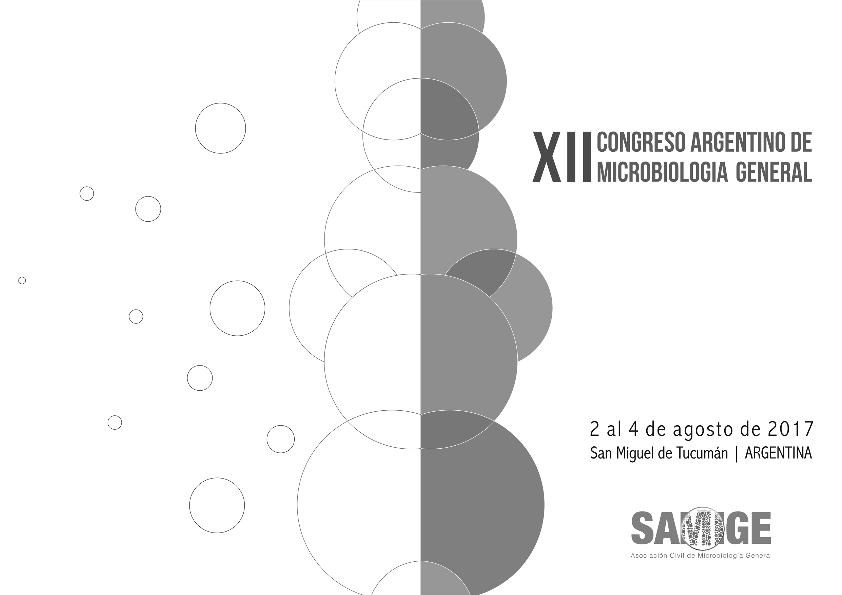Mostrar el registro sencillo del ítem
dc.contributor.author
del Gobbo, Luciana Melisa

dc.contributor.author
Rulli, Macarena María

dc.contributor.author
Cuozzo, Sergio Antonio

dc.contributor.author
Colin, Veronica Leticia

dc.date.available
2023-02-22T16:38:24Z
dc.date.issued
2017
dc.identifier.citation
Selection of vinasse-degrading microorganisms; XII Congreso Argentino de Microbiologia General; San Miguel de Tucumán; Argentina; 2017; 1-2
dc.identifier.uri
http://hdl.handle.net/11336/188605
dc.description.abstract
One of the main problems of the sugar-alcohol industries is the generation of large volumes of vinasse. The release of this acid effluent generated during the alcoholic distillation causes an undesirable environmental impact as a consequence of the high content of organic matter and other toxins. Many technologies based on vinasse conditioning by microbial pathways are continuously evaluated in order to mitigate their environmental impact. In the current study, a preliminary selection of microorganisms from the soil with the potential to grow and degrade effectively the sugarcane vinasse was performed. To perform the isolation, two vinasse concentrations in distilled water (10 and 30%, v/v) added with 2% agar (w/v) were used as selective solid media (VS10 and VS30). An aqueous suspension obtained from a sugarcane vinasse-contaminated soil was inoculated in the VS media. A suspension obtained from same soil but without vinasse was also inoculated in these media to be used as controls. After 48 h of incubation at 30ºC, spores of the microorganisms developed in the VS media were harvested and quantified to be inoculated in a liquid medium consisting of 30% vinasse in distilled water (VL30). At the 72 h of incubation in VL30 (at 30ºC, 150 rpm), the biomass concentration was measured by estimation of the dry weight at 80°C, while the biological oxygen demand in 5 days was quantified by a standard method (BOD5). Under the current assay conditions, no microbial growth in the VS media from the soil samples without vinasse can be detected. However, two types of colonies from soil exposed to raw vinasse were isolated using VS30 as a selective medium. Microscopical observations of the two isolates denoted as V1 (spores pink) and V2 (green spores), revealed sparsely branched and septate hyphae as well as the presence of aspergillary heads. Both isolates were able to grow in VL30 and remove over 50% of the biodegradable organic matter, suggesting a proportional reduction in the effluent toxicity. This finding could be promising in terms of the future application of both strains for recovery of effluents with high load organic like vinasse.
dc.format
application/pdf
dc.language.iso
eng
dc.publisher
Asociación Argentina de Microbiología

dc.rights
info:eu-repo/semantics/openAccess
dc.rights.uri
https://creativecommons.org/licenses/by-nc-sa/2.5/ar/
dc.subject
VINASSE
dc.subject
EFLUENT TOXICITY
dc.subject
BIODEGRADABLE ORGANIC MATTER
dc.subject.classification
Biotecnología Medioambiental

dc.subject.classification
Biotecnología del Medio Ambiente

dc.subject.classification
INGENIERÍAS Y TECNOLOGÍAS

dc.title
Selection of vinasse-degrading microorganisms
dc.type
info:eu-repo/semantics/publishedVersion
dc.type
info:eu-repo/semantics/conferenceObject
dc.type
info:ar-repo/semantics/documento de conferencia
dc.date.updated
2023-02-10T17:53:57Z
dc.journal.pagination
1-2
dc.journal.pais
Argentina

dc.journal.ciudad
San Miguel de Tucuman
dc.description.fil
Fil: del Gobbo, Luciana Melisa. Consejo Nacional de Investigaciones Científicas y Técnicas. Centro Científico Tecnológico Conicet - Tucumán. Planta Piloto de Procesos Industriales Microbiológicos; Argentina
dc.description.fil
Fil: Rulli, Macarena María. Consejo Nacional de Investigaciones Científicas y Técnicas. Centro Científico Tecnológico Conicet - Tucumán. Planta Piloto de Procesos Industriales Microbiológicos; Argentina
dc.description.fil
Fil: Cuozzo, Sergio Antonio. Consejo Nacional de Investigaciones Científicas y Técnicas. Centro Científico Tecnológico Conicet - Tucumán. Planta Piloto de Procesos Industriales Microbiológicos; Argentina
dc.description.fil
Fil: Colin, Veronica Leticia. Consejo Nacional de Investigaciones Científicas y Técnicas. Centro Científico Tecnológico Conicet - Tucumán. Planta Piloto de Procesos Industriales Microbiológicos; Argentina
dc.relation.alternativeid
info:eu-repo/semantics/altIdentifier/url/https://samige.org.ar/wp-content/uploads/2022/10/Libro-SAMIGE-2017.pdf
dc.conicet.rol
Autor

dc.conicet.rol
Autor

dc.conicet.rol
Autor

dc.conicet.rol
Autor

dc.coverage
Nacional
dc.type.subtype
Congreso
dc.description.nombreEvento
XII Congreso Argentino de Microbiologia General
dc.date.evento
2017-08
dc.description.ciudadEvento
San Miguel de Tucumán
dc.description.paisEvento
Argentina

dc.type.publicacion
Book
dc.description.institucionOrganizadora
Asociación Argentina de Microbiología
dc.source.libro
XII Congreso Argentino de Micorbiología General
dc.type
Congreso
Archivos asociados
